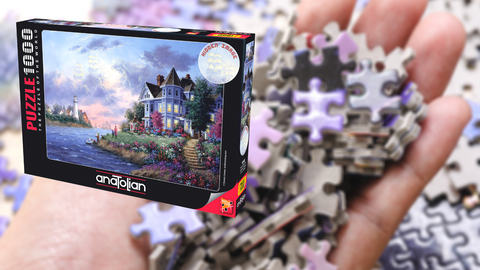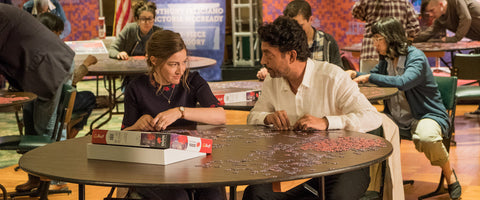Are Jigsaw Puzzles The New Adult Coloring Books?
My mom is a longtime jigsaw puzzler. When I was young, seeing her leaning over a pile of cut-outs, piecing them together to form various pictures of orchids or landscapes or puppies was a nightly thing. She even had a wooden table dedicated to her puzzling hobby, complete with a special lamp and leather chair.
I always thought of her jigsaw addiction as a quirky, endearing "mom" trait. So when I started noticing the puzzles popping up more and more in my daily life, at first I thought I was homesick. But as I listened to my friends gush about how jigsaw puzzles helped them relax and unwind, I found myself wondering whether this was an actual trend.
It is. The jigsaw market is growing globally, and is expected to reach $730 million by 2024, MarketWatch reports. Plus, there’s a strangely satisfying subreddit entirely full of pictures of completed puzzles.
And just like the adult coloring book craze of 2015, this trend is being driven at least in part by jigsaw puzzles' ability to bust stress. Research suggests that puzzles may help your brain, and even potentially prevent cognitive disorders as you age. Anecdotal evidence suggests they help with anxiety. They may even help you fall asleep at night, says Jim Horne, Ph.D., professor emeritus of psychophysiology at Loughborough University in England and the author of Sleeplessness.
“It’s a bizarre recommendation,” Horne acknowledges, but still advises people try it if they're consistently stressed at night. Looking for matching pieces takes your mind off your worries, he says. “It’s a great distraction. It might sound pointless, but it’s even more pointless to lie there at night thinking about trying to go to sleep."
Kaylin Marcotte began doing jigsaws in 2015 to cope with the stress of her job at a startup. It became a habit, and a “form of meditation” for her.
“It’s relaxing because it forces you to not do a couple of things,” she says. “There’s no way to be on a screen when you’re doing it, and there’s really no way to multitask. It’s just you and your puzzle, and it’s a full-brain exercise that lets you tune out all your other concerns and stressors in that moment.” All you're brainpower goes to finding two pieces that fit perfectly together.
Marcotte got so into her puzzle hobby that she ended up developing her own company, Jiggy, which launched last month. The unique, creative pictures on each puzzle are designed by female artists only. Plus, the jigsaws are small enough to fit a standard frame and each set comes with puzzle glue, so you can show off your finished creations forever.
But even if you prefer to dismantle your jigsaw after completing it (a la sand mandala rituals), you can still benefit from the process of puzzling, Marcotte says.
“It’s all about the creation process,” she says. “And the journey,”
by Molly Longman
(Ref: https://www.refinery29.com/en-us/jigsaw-puzzle-therapy-anxiety-trend )

Jigsaw Puzzle Strategies, Tips and Hints
May 20, 2019

